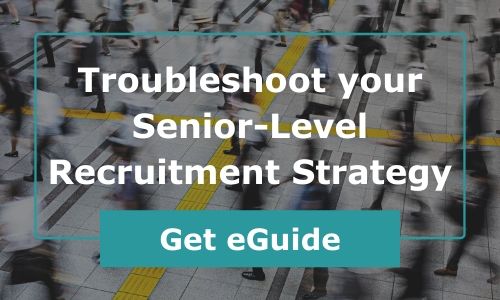Interviews are a two-way street. If you want to win over top-talent, then as the hiring manager, you need to nail the interview. While you’ll be assessing their abilities, they’ll be trying to suss whether they want to work for you and your organisation. Failure to leave a good impression could lead to top-talent slipping through your fingers, not to mention the long-lasting damage done to your employer brand.
Your interview performance matters. In our LinkedIn poll, 83% of respondents said they have turned down a job offer before because of a poor interview experience, demonstrating the importance of creating a positive candidate experience. While you might think you’ve found the star candidate, your attitude or disorganisation in the interview process could lead to them rejecting your offer. Then you’re back to square one in your quest to find innovative talent.
Here are 9 steps to help you create a first-class candidate experience in the interview process:
Communicate with all hiring stakeholders
The first step is to align all of the hiring stakeholders involved in the process. They must be aware of what to look for in terms of experience and skills, otherwise, they’ll have nothing to measure each candidate against.
Arrange a team meeting before the interview and give a brief overview of the candidate. With busy schedules and multiple candidates to interview, it’s impossible to expect all hiring stakeholders to be well-informed. Refresh their knowledge on each candidate and remember to include the key reasons why each candidate has been shortlisted and invited to interview. The candidate will be receptive to the hiring manager if they can remember information about them and personalise the interview.
Prepare the candidate
Once you’ve shortlisted your chosen candidates and arranged an interview with them over the phone, send them a follow-up email with the details of the interview:
- The date and time of the interview
- How long you expect the interview to take: Executives and senior managers have busy schedules and may require clarity on how much time in their schedules they should allocate to the interview. By blocking out a length of time in their diaries, they can adjust their schedule and make suitable travel arrangements.
- The location of the interview: Provide instructions on how to get there, where to park and how to access the building.
- The format of the interview: Will the candidates have to do a presentation? Will there be an assessment? Will they receive a tour of the office?
Preparing the candidate allows them to come to the interview confident. When candidates are confident, they’re more likely to perform to the best of their abilities and give you an honest reflection of their abilities. If they’re not sufficiently prepared and as a result, feel stressed, they will leave the interview feeling disheartened and hostile towards you and your organisation.
Get a list of questions ready
Knowing what questions to ask and what not to ask is a crucial aspect of the interview. Rather than coming up with questions on the spot and expecting magic to happen, you should prepare your questions in advance. That way, you can ensure you have a good combination of both hypothetical and behaviour/competency-based questions.
The last thing candidates want is to sit through your blunders or be asked something that could lead to bias. For more guidance on interview questions, read our blog: How To Interview Candidates: Ask The Right Questions.
Actively listen to the candidate
The purpose of the interview is to assess the candidate, so paying attention to what they say is crucial. Although interviews can be tedious and cause you to think about the massive pile of paperwork on your desk, you need to act like you want to be there. Observe your body language and facial expressions; does it demonstrate someone who’s actively engaged? Are you checking the time or looking at your phone regularly?
The key to creating a positive candidate experience is to treat the candidate as if they’re the only one that matters. If the candidate feels disrespected or insulted at your lack of attention, this could be the catalyst to them rejecting your offer and badmouthing your organisation. This can have a detrimental impact on your employer brand and your ability to attract top talent. However, when candidates feel heard and respected, they feel more positive towards you and your organisation.
Offer them something different
If your goal is to attract, engage and secure top-talent, then the standardised interview isn’t going to cut it. Don’t just wave off the candidate after their interview – why not extend the experience and give them a tour of the office or site? Showing them where they’ll be working might help them to picture themselves working there. Candidate experience is improved by taking the interview one step further and allowing the candidate access to the company culture.
RELATED: Increase quality-of-hire by partnering with a reputable boutique executive search firm
Get clear on your decision timeline
Many candidates leave interviews with no knowledge of if they’ll ever hear from the hiring manager again. If days go by and the candidate doesn’t hear from you, they may lose interest and faith in your organisation. Before you even commence the interviews, you should set hiring and decision goals. Once the interview is over you can communicate this to the candidate and work towards this deadline. It can be tempting to ghost your unsuccessful candidates and save yourself from delivering the bad news. However, it’s worth remembering that candidates can talk; if they feel disrespected or ignored, they will tell their network, which encourages this top talent away from ever applying to your organisation.
Arrange a meeting with the hiring stakeholders
This meeting should take place immediately after the interview to discuss initial thoughts on the candidate. It should be done on a 1:1 basis with each hiring stakeholder to avoid conformity bias. This is where they might feel inclined to go along with others rather than practising their own independent judgement. The purpose of this meeting is to obtain their individual opinions on the success of each candidate before they have the opportunity to sway each other.
Give candidates feedback
Whether they were successful or unsuccessful, giving feedback on their interview performance adds to the candidate experience. Don’t withhold bad news – let them know your decision as soon as you can. Interview feedback helps people to learn and improve rather than hold resentment towards you for not hiring them. It also instils greater confidence in both successful and unsuccessful candidates as it conjures up ‘no hard feelings’. By demonstrating humility and empathy, you can strengthen their candidate experience.
Keep in touch with promising candidates
You might encounter the classic scenario of the right person, wrong time. While they might not fit the current role you’re hiring for, you can call upon them in the future for a more fitting position. For this reason, it’s beneficial to stay in contact and maintain a good relationship. When you tell them that they’ve been unsuccessful, let them down gently. Tell them that you were really impressed with their abilities and will consider them for future positions.
Conclusions
If you want to secure top-talent then you need to give them a first-class candidate experience in the interview process. A poor candidate experience leads to top-talent slipping through your fingers and damaging your employer brand. If you create a bad experience, candidates will talk and you may find that less candidates are willing to work for you. Damage to your employer brand could fail to engage top-talent that could have had a significant impact on your organisation.
For more hiring advice tailored to hiring managers in the life science industry…
- Read our blog: Hiring Managers: How To Prepare For A Killer Interview
- View our talent solutions to see how we can help you gain a competitive edge through talent.
* Fraser Dove International is a talent consultancy operating exclusively across the life sciences industry. While our roots lie in executive search, we provide more than the traditional recruitment services. Uniquely placed within the market, we have been providing cutting-edge talent solutions and insight to organisations at all stages of their journey – from start-up to established leaders – since 2013.

 Estimated read time: 5 mins
Estimated read time: 5 mins Date posted:27/07/2020
Date posted:27/07/2020





